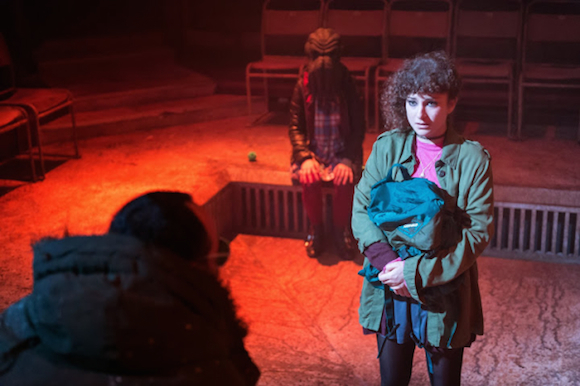Catherine Love: What makes a good conclusion?

© Manuel Harlan
This week's blog is a farewell of sorts. As the year draws rapidly to a close and as I hang up my WhatsOnStage blogging hat to focus on my PhD, I'm (unsurprisingly) thinking about endings. So what makes a good conclusion?
Looking back on what has been a pretty extraordinary year as far as theatre goes, I realise that many of the shows to leave the strongest impression on me have done so in their parting moments. Whether it's the final bracing blast of This Is How We Die, the devastating image that closes Ivo van Hove's A View from the Bridge, or the tear-wringing conclusion of Spine, much of 2014's theatre has, to quote Vanessa Williams, saved the best for last.
But it's not just about catharsis. Some of the best endings are actually those that refuse to end, instead holding something open for the audience. Tying up loose ends is all very well, but sometimes we need those hanging threads to grasp onto and tug a little further. Almost all of my favourite experiences at the theatre – or certainly those that have most vividly etched themselves onto my memory – have left me turning the event and its ideas over in my head for long after. That doesn't tend to happen when conclusions are neat and tidy.
One recent and particularly brilliant example is Alistair McDowall's new play Pomona at the Orange Tree, which has shot right up my list of theatre highlights this year. It's a real head-scratcher of a play, given an appropriately dark and complex production by Ned Bennet. In it, fiction and reality bleed into one another; it's never quite clear what's real and what's imagined. And the ending, in the style of all the best psychological thrillers, leaves its audience still guessing, as the play's different strands are once again tangled.
As well as leaving the theatre puzzled, galvanised or emotionally wrung-out, sometimes I just want to walk out bursting with joy. On this front, Secret Theatre's A Series of Increasingly Impossible Acts is the show to beat. I've now seen it four times, and while – thanks to its improvised structure – each performance has been dramatically different, it always closes on an ecstatic note. I won't give too much away, as there are still opportunities to catch the show on tour, but the last two sequences seem to me to encapsulate all that is joyous and hopeful about the shared act of coming together in the theatre.
As for my own conclusions, it seems fitting to leave them open. More often than not I've used this blog to ask questions, without always fully answering them. That might be frustrating for some, but for me it's what theatre does best: it asks questions. The answers – and perhaps even the endings – are up to the rest of us.










